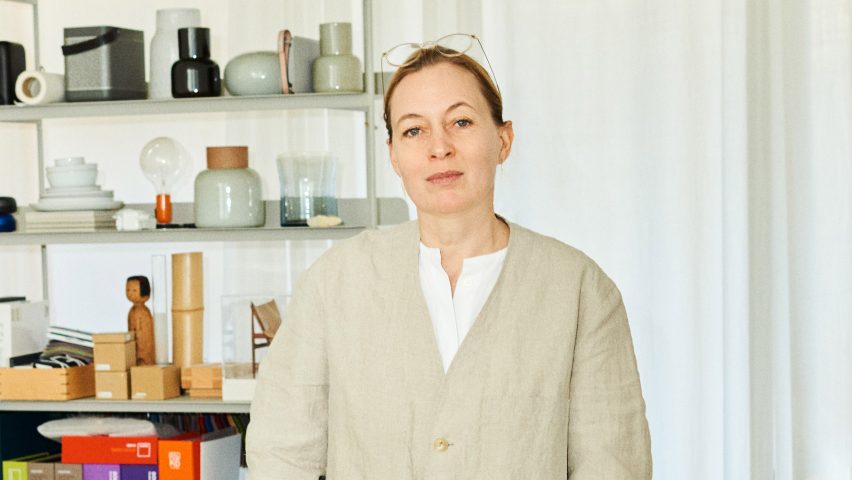Labels relating to function or aesthetics can get in the way of designing great furniture, Danish designer Cecilie Manz says in an exclusive interview.
"The industry likes to label everything," she told Dezeen.
"Why can't a nice chair just be a nice chair? As long as it's comfortable, people can judge for themselves where it works best."
Manz was discussing Monolit, a chair she developed with Danish manufacturer Fritz Hansen, which launches this week as part of 3 Days of Design in Copenhagen.
Monolit is an upholstered plywood shell chair with leather edging details, available in two different heights.
Manz's aim with this project, she explained, was simply to create a chair that allows someone to sit comfortably for a long period without taking up too much space in a room.
She believes that categories like "dining chair" or "lounge chair" make it harder for designers to create products that will remain useful as tastes and lifestyles change in the future.
"It can be a constraint; the chair must be a certain height or dimensions," Manz said. "I wanted to take a step back; my wish was just to make a nice, comfortable chair."
This sense of functional ambiguity is a common theme in the Copenhagen-based designer's work.
Her previous designs for Fritz Hansen include the pebble-shaped Pouf seat, launched in 2016, and the concave Taburet stool/side table, launched in 2023.
Other brand collaborations include Plint, a piece of furniture launched by Takt in 2020 which can serve as a bench or coffee table, and the Workshop Table for Muuto, a deliberately simple dining table.
"I don't believe in trying to squeeze too many functionalities into one piece, but if it's a good piece of furniture then you should be able to use it in different ways," Manz said.
Manz is equally keen to avoid being labelled herself, particularly when it comes to gender.
Her designs are highly pared back, with objects often made from just one or two materials and a strong focus on simple, elemental forms. This contrasts with the trope of "feminine design", which typically calls for curved shapes and soft colours.
In an interview with Dezeen in 2018, Manz described how sometimes, as a woman, she had to make it clear to brands that she wouldn't adhere to gender stereotypes.
Today, the designer said that brands know better than to ask her. "It's old-fashioned; I see it less and less," she stated.
When asked whether she sees herself as a role model for young women in industrial design, she answered: "Why only women?"
Some might describe Manz's style as minimalist or functionalist. The designer said she usually tries to create objects that balance simplicity with a touch of character.
"I don't think I'm a true minimalist," she stated. "It's a process; I always end up cutting away and cutting away, then adding something back if I went too far and lost the character."
This approach is visible in another design that Manz is unveiling during 3 Days of Design, a collection for Swedish carpet producer Kasthall.
Landskab is a series of nature-inspired rugs made with linen, pairing natural tones with subtle accent colours.
"We found an old technique that allows the linen to peek out from the surface," said Manz.
Manz believes it is important for a design to reflect the heritage and identity of the manufacturer.
To develop Landskab, she spent time in the workshop learning about Kasthall's production processes. Similarly, Monolit builds on the woodcraft and upholstery techniques that Fritz Hansen is known for.
"I don't like to design something and pass it around to whoever," she said.
"I think it's my job as a designer to read the company I'm working with, their history, and to work towards something that is meant to be for them."
Manz describes her process as "very old school". She has a very small team consisting of just herself and two others, and she invests a lot of time in producing sketches and full-scale models.
"We don't just deliver sketches; it doesn't work like that," she said.
"I'm always trying to challenge myself and I want to be part of the whole process," she continued. "When we do the process in a slow way, we gain knowledge."
Monolit will be on show during 3 Days of Design as part of Fritz Hansen's exhibition, Islands of Wellbeing, while Landskab will be on show for Framing at Odd Fellow Palace.
Manz believes the growth of the Copenhagen design festival is a positive for the design industry in Denmark.
"But we should take care that it doesn't get too big," she warned. "We still want to be selective and not lose the quality."
The photography is courtesy of Fritz Hansen and Kasthall.
3 Days of Design will take place at venues across Copenhagen from 12 to 14 June. For more events, exhibitions and talks in architecture and design visit Dezeen Events Guide.

